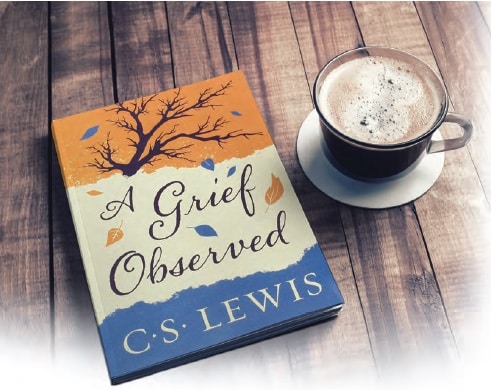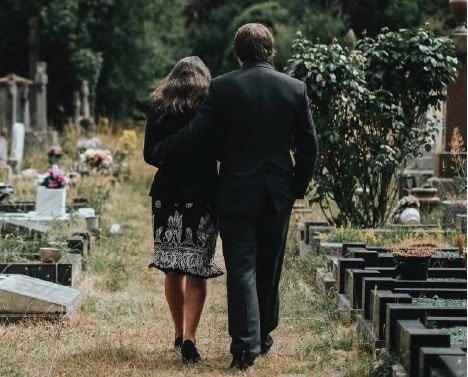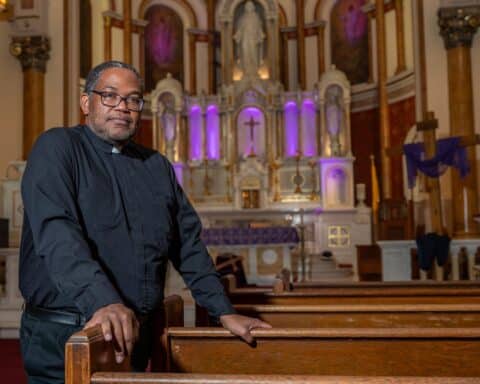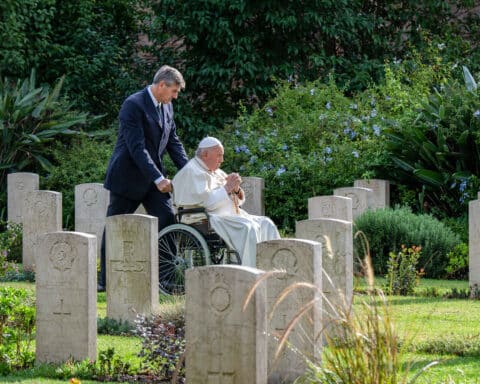Grief enters all of our lives at different times and in different ways. Regardless of how recent or how long ago, grief can often intensify or sneak back for a visit during the fall and winter seasons. We may feel it on Nov. 2, when the Church observes the feast of All Souls and we remember in a special way all those loved ones who have gone before — whether just a few weeks ago or many years ago. We may feel grief rear its ugly head when we are aware of the empty place at the Thanksgiving table. And Christmas always brings back memories of those who once gave us gifts or for whom we no longer need to buy a gift. Yet, no matter when grief comes to call, we often find ourselves wondering if this is the way grief should be. Do others grieve as horribly as I do? Do others keep carrying this around for so long? Do others have the same fears and anger that I have? Do others feel that God does not care?
The answer to all of those is “yes” … and “no.” No one will grieve the same way, because no one had exactly the same relationship as we had with the person we lost. Even two twins, who are grieving the same parent, will grieve differently. Thus, there is no right or wrong way to grieve. Years ago, there was a belief that our grief should follow certain stages. We know that is no longer true. Some people will never get angry; that does not mean anger is wrong. Some people may be able to accept a death immediately, while others will live in denial for weeks or even months.
Thinking there must be a right way to grieve is as foolish as thinking there is only one right way to know joy. That is why the famous Christian writer C.S. Lewis left us such a great gift in his book “A Grief Observed.” Lewis is best known for such classics as “Mere Christianity,” “The Problem of Pain,” “The Screwtape Letters,” “The Chronicles of Narnia” and “The Space Trilogy.” We would think that such a renowned author would know the right way to grieve. But when his beloved wife died, Lewis fell apart. He yelled at God and doubted the faith he had once so strongly upheld in his writings. Naturally, he turned to writing as a way to release some of the pain he was feeling.
Unwilling to even go out and buy paper, Lewis filled every notebook he could find in his house with his rantings about grief. Eventually, as he came to peace with his great loss, he told his publisher about what he had written. The publisher wanted to turn the collected notes into a book. Lewis, however, was not comfortable having his most personal and doubt-filled words in public hands. He did agree to let his grief journals be published as the book “A Grief Observed” under the pen name N.W. Clerk. Once the book was in print, Lewis’ friends, who knew of his great grief, would suggest Lewis read “A Grief Observed.” No one ever knew Lewis was the author. It was only after Lewis’ death that the publisher was allowed to reprint the book under Lewis’ name. The book is a gift to all those who grieve. It shows us that grief is a deeply spiritual experience that can draw us closer to God, if we only open our hearts to it, rather than trying to block or deny our feelings.

A great fear

“No one ever told me that grief felt so like fear.” With these words, Lewis began “A Grief Observed.” Fear is a part of any grief. We are afraid of the new responsibilities that might fall on our shoulders. We are afraid people will avoid us or overwhelm us with attention we do not want. We are afraid of being alone, but we are also afraid of being with other people who may pry too much. Describing this fear, Lewis concluded that he liked having other people around but he would prefer that they talk to each other and not to him.
Lewis was also afraid of what life would be like without his dear one. We are afraid, quite honestly, that nothing will be right again in our lives. Lewis wrote that fear as an “invisible blanket between the world and me.” The problem comes when we don’t let God get in under the blanket with us.
Loss of Faith

One devastating aspect of grief can be the terrible sense that God is not there. In the midst of our worst sadness, it might be difficult to feel God’s touch. Lewis felt God had betrayed him in his grief. He wrote, “Go to Him when your need is desperate, when all other help is in vain, and what do you find? A door slammed in your face?” This is not an uncommon feeling.
When grief is overwhelming, it is hard to hear, see or feel anything but our own pain. Even on the cross, Jesus cried out, “My God, my God why have you forsaken me?” (Mt 27:46). Our Lord was quoting from Psalm 22. The Old Testament offers many examples of people who felt God had abandoned them in their grief. The entire Book of Job is a story of angry grief. Grief can wrap us in so much darkness that it takes a great deal of trust and courage to pull back the black curtain and let a little bit of God’s light stream into our lives again.
Struggling to trust

We need to let God into our lives because he is the only one who can truly heal our grief. However, this is not easy for us to do if we think it is God who caused the death, who failed to cure the disease or who let the accident happen. We don’t usually trust someone who has hurt us. Lewis wrote that he was not in danger of failing to believe in God. Instead, Lewis felt the greater danger was that he was “coming to believe such dreadful things about Him.”
It is natural that, whenever something bad happens, we want to have someone to blame. Our rational mind may tell us that bad things happen to good people. And we know death must come to all of us. But our hurting soul just needs to yell at someone. Often, that someone is God. We forget it was mankind, through original sin, who turned our backs on God, not God who turned his back on us. We forget that the collective free will and bad choices of all people are what causes death for all of us. Free will leads to wars, accidents, sickness and abuse. God does not step in to stop every evil. When he does, it is a miracle. But miracles do not happen every day. And that can cause us to question just how much we trust God.
Feeling like a leper

Let’s admit it: We are uncomfortable around grief. Until we have experienced a deep grief of our own, we do not know what to say or do when we are with someone who is grieving. It just might be easier to avoid them. The first time I experienced deep grief was when my dad died. I realized then that I needed to apologize to my best friend who had lost her mother several years earlier. Because I had not yet known grief, I did not, at that time, know what to say to her or how to help her. Lewis felt that his friends, too, had failed him. Their discomfort around him was tangible. His angry suggestion was, “perhaps the bereaved ought to be isolated in special settlements like lepers.”
Isolation, however, is not the answer. Remember that in the greatest moment of grief imaginable, Mary, at the foot of the cross, had the apostle John and other women with her to support her. If the Blessed Mother needed others to help her face her grief, what makes us think we can. Often, however, it is we who are grieving who must help others feel comfortable around us. It may not be fair, but that’s the way it is. When I apologized to my friend for not knowing how to help her in her grief, she said at least I had always listened. We all need to find someone who will listen to us in the midst of our grief — someone who can listen with the ears of God. We must not let ourselves become a leper.
Unexpected grief

We know we must grieve for a while. Lewis, however, was bothered by the unexpectedness of grief. He wrote, “Grief is like a bomber circling around and dropping its bombs.” He said he would much prefer physical pain than the surprise attacks of grief. It is true that grief can sneak up on us when we least expect it. Speaking of his deceased wife, Lewis wrote, “So many roads lead to (her).” And we are hit anew with grief each time we stumble upon another one of those roads that reminds us of our loss.
It might happen at home, while with friends, at church or out shopping. Like a dentist hitting a nerve, a memory is suddenly triggered. It hurts. Tears start to fall. We just want to get away from it. But it is only by facing these feelings that we can grow from them. Staying locked at home will not protect us. It is not until we venture out and face the memories that we can find peace and healing — even if it takes a few unexpected tears to get there. At times like this, it is good to remember that our embarrassing tears are precious to God. A beautiful image to comfort us is contained in the words of the psalmist to God: “are my tears not stored in your flask?” (Ps 56:9). We should never be ashamed to add a few more tears to that flask God holds so close to His heart.
Is Lazarus the greatest saint?

Lewis gradually came to feel that his grief was self-centered. We think we are mourning for the one who died. But mostly we are mourning that we are left behind. It is said that every life is a full life because each of us lives exactly the number of days God had planned for us to be on this earth. So, the deceased has not been deprived of anything. We have! Once Lewis got over his anger at God — whom he called earlier in his grief the “Cosmic Sadist” — he realized his wife was held in the arms of a loving God. He wrote, “The insane call, ‘Come back,’ is all for my own sake. … Could I have wished her anything worse? They call Stephen the first martyr. Hadn’t Lazarus the rawer deal?”
Lewis is referring to the raising of Lazarus (cf. Jn 11:1-44). It is in this Gospel story that Jesus shows human grief over the death of his good friend. The shortest verse in all of the Gospels tells us, “And Jesus wept” (Jn 11:35). But then Jesus “cried out in a loud voice, ‘Lazarus, come out!'” (Jn 11:43). Lewis, finally feeling assured that his wife was at peace in the loving arms of God, now saw it as cruel to call someone to return from the dead. He failed to consider that the reason Lazarus came back so willingly was because he was coming into the arms of Jesus. Lewis ends his book by deciding, “How wicked it would be, if we could, to call the dead back!”
The dawning of good days

Gradually, as Lewis poured out his grief into his journals, he wrote one morning, “Something quite unexpected has happened.” He noted that he had had a good night’s sleep. He felt at peace. He was no longer exhausted. And he realized he could think of his beloved wife without all of the pain, anger and sadness that had once haunted his every thought of her. And he joyfully wrote in his journal that when he mourned his wife the least, he “remembered her best.” It is true that when our hearts are heavy with grief it is difficult to have good memories. But as we are able to let go of the grief, we can open ourselves to something good, beautiful and healing. Lewis said, “It was as if the lifting of sorrow removed a barrier.”
Letting go of our grief does not always come easily. It takes a lot of prayer. It takes a strong resolve to face the future, rather than living in the past. It takes surrender to the will of God. But when we start to do this, we will begin to see there is still goodness in our lives. Lewis writes, “You can’t see anything properly while your eyes are blurred with tears.” Fortunately, we have a God who will dry our tears, if we let him. He will change our “mourning into dancing” (Ps 30:12).
| A Prayer for the Grief Journey |
|---|
 Dear Lord, please walk with me through my time of grief. Be the light that will lead me out of my darkness. Help me to see that grief is not a place where You want me to stay. Let me learn the lessons, I must learn as I struggle with this overwhelming sadness. When I want to just hide myself under a blanket, please lift the corner and gently pull me out. Forgive me for the times when I get angry with You or cannot seem to trust You. You know that in the depths of my heart, buried under all this pain, I still love You. And I need You! Only You can lead me out of this dark sadness. Help me find ways to forgive and stay connected with the people who may not understand me now. Remind me that others do not intentionally mean to hurt me. Give me strength for the times when grief catches me off guard. Let me feel You always right beside me, ready to dry my tears. Help me to find peace knowing my dear one is in Your loving arms. Open my eyes to how selfish it is for me to want them back. Please help me to find joy in a new and different normal, but a normal where You will always and forever be by my side. Thank You, dear Lord. |
Getting over it

Perhaps one of the worst things we can hear when we are grieving is for someone to tell us we just have to get over it. Lewis compares the loss of a loved one to a major surgery. He says it might be easy to get over the loss of our appendix. It never really seemed to serve any purpose anyway. But we never get over the amputation of a leg. We miss it every day. We will never be the same. We might heal. We might learn to walk again. We will go on living. But it will be very different. Lewis says, “At present I am learning to get around on crutches.” This new life does not have to be bad. We can laugh again. We can have joy and hope and love again. Just in a new way. Maybe with a limp.
Lewis suggests that, at some level, a refusal to let go of our grief is a form of vanity. We like being what he calls “tragic heroes.” He concludes that if our deceased loved ones could talk to us, they would beg us to stop. He resolves that he will turn to his wife as often as possible with gladness, because, “The less I mourn her the nearer I seem to her.” Endless grief can set up a wall not only between us and the living but also between us and God and between us and our deceased loved ones.
As we consider the many facets of Lewis’ grief, we must keep in mind that every grief is different. Yet, it helps to know that even the wisest among us can have a difficult struggle with grief and still come out on the other side with renewed faith, hope, peace, love and even joy.
Susan M. Erschen writes from Missouri.
| The Healing Power of Writing |
|---|
 Lewis’ book, “A Grief Observed,” is a wonderful example of how writing can help us heal from grief. Lewis went from a man who called God “an evil Sadist,” to a man who wrote, “I know the two great commandments, and I better get on with them.” Through his writing, he was able to bring himself to a place where he was ready to again love God and his neighbors — even those who had seemed to fail him while he grieved. It is not just because C.S. Lewis was a famous author that writing was healing for him. Many grief counselors encourage those who are grieving to keep a journal. Here’s why: The thoughts in our brain are circular. They keep going round and round. We might think over and over, “I can’t do this! This is not fair.” Our brain loves to play with these thoughts like a cat with a ball. However, writing is linear. We hate writing the same thing over and over again. Being told to write something 100 times is the worst punishment children can be given in school. So, once we write in our journal, “I can’t do this,” our mind is ready for a new thought. It may keep rambling around with some other complaints, but eventually it might ask us, “What could you do?” or “What would your loved one want you to do?” Then from our pen will flow ideas and thoughts that would never come if we just kept our heads buried in a pillow crying, “I can’t do this.” One excellent way to start a healing writing practice is by writing letters to God. All we have to do is pick up a pen or sit down at a computer and begin with, “Dear God ….” In many ways, writing to God can be easier than talking to him. And at some point, we may even feel that God has taken over and is writing words and ideas we did not even know were in us. That is God whispering the perfect healing words to us. |





